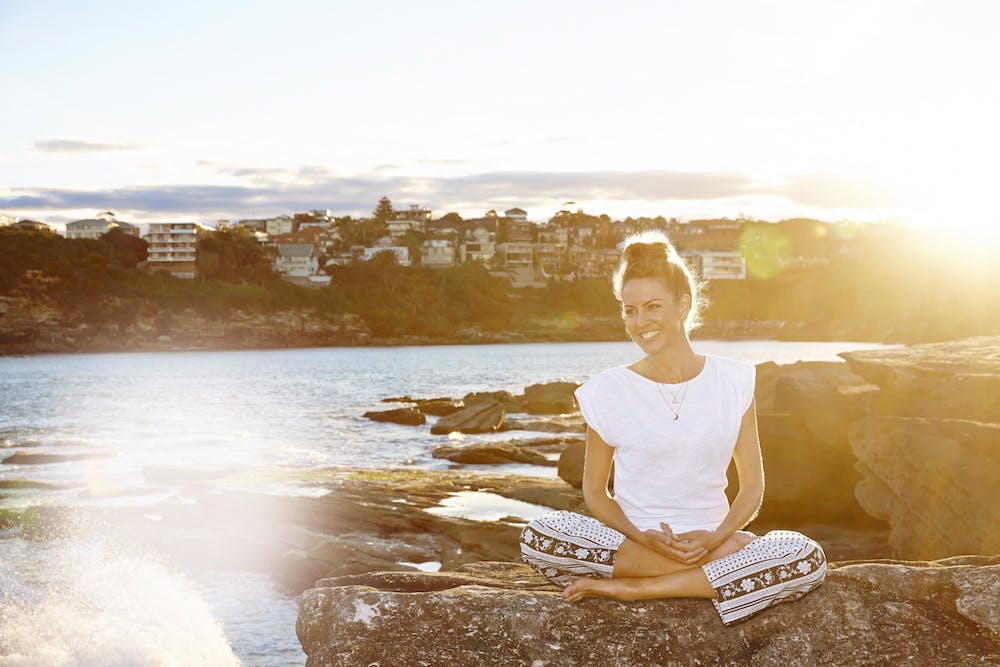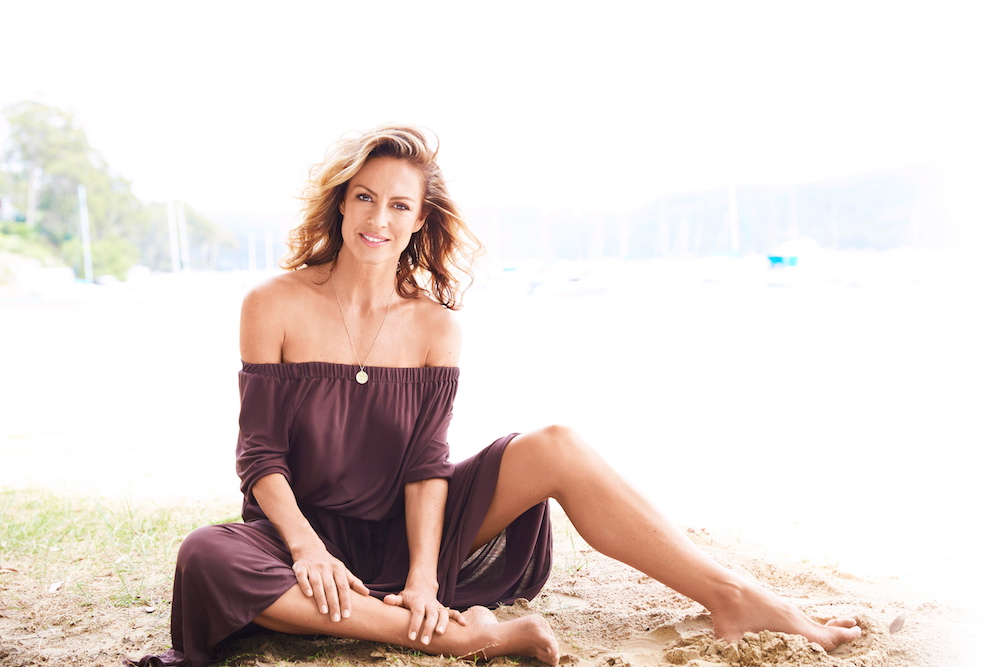
After helping more than 1.5 million people to quit sugar, Sarah Wilson has opened up the conversation about anxiety and reframing our own ‘beasts’
The night before my interview with Sarah Wilson, I finish her latest book First, We Make the Beast Beautiful, and feel slightly guilty. A large proportion of the pages have scribbles on them – my notes to look at the research she has mentioned, or to remember her methods to deal with anxiety and try them out.
My book “graffiti” is the first thing I confess to her, apologetically, when we speak – but Sarah seems to be pleased: “I wrote it that way, with the wider margins so that I could add in notes when it came to editing, and so other people could write their notes too – it’s a good thing.”

Sarah-Wilson
Sarah has vast experience when it comes to writing. She’s a New York Times best-selling author, with a journalistic career spanning more than 20 years across radio, television, newspapers and magazines (including her former role as editor of Australian Cosmopolitan).
First, We Make the Beast Beautiful is her latest book, originally published in her home country, Australia, back in February 2017, and now available in the UK and US. Her other books arose from her research on sugar-free living as the founder and director of I Quit Sugar – a programme that has helped more than 1.5 million people across the world, and has seen her published in 46 countries, so far.
Sarah’s writing is rich, conversational, full to the brim with research, and balanced by a continual questioning of collective preconceptions – plus a huge amount of her own personal experience. She recounts living with anxiety from childhood, bulimia, OCD, insomnia and being bipolar, and her darkest moments as an adult. Her honesty about her experiences draws a similar response in others. After reading her latest book, one man travelled across Australia to hear Sarah speak, confessing that reading her book allowed him to understand what his daughter had been experiencing. They had been estranged for some time, but with his new understanding of her anxiety, they found a way to rekindle their relationship.
While the impact of her book on others has undoubtedly been positive, the process of writing it was a difficult one. “It was painful, but it was also therapy,” Sarah reflects. “It took me right back down into it. I’d lived in various countries, I’d had a miscarriage, I had a relationship break up, two suicide attempts – it was the full thing. The reason I wrote the book was because I wanted to have a better conversation. I was lonely. I figured if I went first, then a better conversation could start – and I was happy to go first.
“And it’s worked. Now, I’m centred – I feel like I’ve arrived in my life and established a great pivot point for the future,” Sarah says. “The book has started some beautiful conversations – with people in the street, my family, uncles and cousins who have been relieved to know that someone else has similar experiences, and that they could now talk openly about their’s.”
Sarah is passionate about helping people to talk and I’m reminded of a passage, early in the book: “My qualifications for writing this book, then, if this matters to you, is that I’m a committed striver. I’m strapped in. Doing the work and keen to start the conversation.” By “going first” in these discussions, she helps others to share their own story and find a way of reframing their beasts.
In the book, Sarah questions whether we could unravel the notion that anxiety (the beast) is something to be medicated and eradicated, or whether there is a way we can live with it, understand it, and possibly even thrive with our anxiety? She explores the importance of pain, building boundaries, gratitude, rejecting “perfect moment” syndrome, meditation – and so much more.
In the early pages of The Beast, Sarah also speaks of having Hashimoto’s – an autoimmune disease of the thyroid that can affect numerous functions including metabolism, heart rate, blood sugar, mood and sleep. She offers the widely-discussed assertion that autoimmune diseases, like other inflammatory diseases, can affect how our neurotransmitters communicate, indicating that there is a link between gut health, inflammation and anxiety: “Put simply, if you have fire in your gut, you have fire in your brain.”
Sarah has already done a mammoth amount of investigation of her own (she has been described as a “hypervigilant researcher”) about gut health and the impact of diet, becoming a qualified health coach and meeting with endocrine and nutrition specialists around the world. This work resulted in I Quit Sugar, which launched in 2011. Ever the conversation-starter, Sarah passed on the knowledge she had gained and implemented herself through the IQS programmes, cookbooks and her social media accounts.
Earlier this year, she made the hard decision to close I Quit Sugar, writing an open and heartfelt explanation on her website. Sarah’s books and teachings on sugar-free eating remain, as do the advocates who have followed the programme, many seeing remarkable results on their physical and mental health.
Her work on mental health and diet will continue, and she has recently produced an e-book The Anti-Anxiety Diet: A Two-Week Sugar Detox That Tackles Anxiety – For Good (about what you can eat rather than restrictions) to sit alongside First, We Make The Beast Beautiful.
As for future plans, expect further news from Sarah on her ideas to encourage less waste.
“I’m working on a book about food waste, which is my big passion,” she notes. “It’s a zero food waste cookbook and it’s never been done before, in the sense that even in the writing and shooting of the book there’s no food wasted, everything will be reused, and there’s no plastic.”
The conversation around plastic and waste is one that really fires Sarah up. “I am aching to get people to stop just talking and retweeting about plastic pollution and truly engage with and live the changes, not just because the planet needs it but because we need it,” she says. “That mushy cucumber in the back of the fridge makes us cringe. The way we’re consuming things – all the stuff that gets tossed out – makes us feel horrible. We need to start a new conversation about trying different ways – and again, I’m happy to go first.”
Like the reframing of our mental challenges, Sarah feels that just as we need to stop searching for perfection in how we experience our lives, we should apply the same acceptance mindset to how we consume, making the very best of what we have available to us.
Back then, to my scribbled on copy of The Beast. Sarah insists that she wants people to read and pass it on, to continue the conversation – recycling the book. I suggest that I’ll lend mine to my husband, to see what he makes of my scribbles, and I’ll get to look through his notes upon its return. “That’s a good experiment!” Sarah responds, and I feel a little less criminal for defacing her beautiful book.
“The book isn’t just for anxious people, we’ve seen that already,” she adds. “A lot of people who have an anxious loved one in their life have gone out to buy it, just to understand it more, and people gift it to one another, for that reason.”
As we finish our conversation, I ask Sarah what else someone can do if a loved one is struggling? “Be there, make decisions for them – the small ones. Often anxiety can take away the ability to do that. So say to them: ‘I want to eat, I’m going to come around and make dinner, and I’ll leave at 9pm.’ Let them know the boundaries of your support.
“Also, understand that sometimes, it can seem like they are being controlling – but they are just trying to control the parameters of what’s happening to alleviate their own anxieties. Once you know that, you can stop thinking they are trying to ruin an experience and you can be their rock.”
I’d add just one more suggestion to Sarah’s. Give them a copy of First, We Make the Beast Beautiful, a pen, and an open invitation to scribble and talk.
First, We Make The Beast Beautiful is available now and The Anti-Anxiety Diet (a two-week sugar detox that tackles anxiety – for good) e-book is available to download from Amazon.
Read more about Sarah’s work around anxiety, nutrition, food waste and minimalist living at sarahwilson.com

